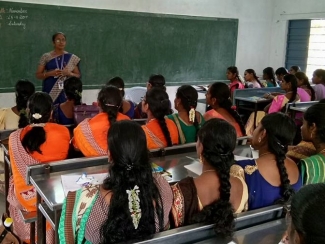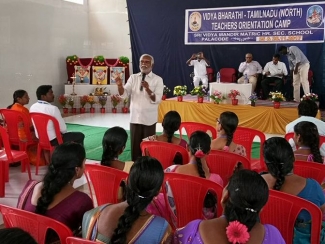

Teachers Training
The value of every school depends primarily upon the teacher. - Shelton E. Davis (Educationist)
In any scheme of education, I give the central place to the teacher. - Nelson L Bausig
Who dares to teach must never cease to learn. - John Cotton Dana
One good schoolmaster is worth a thousand priests. - Ingersol
The significance and role of teachers for any nation are underscored by various thinkers and philosophers. No Nation can rise above the standard of its education system. And no education, in turn, can be above the quality and standard of its teachers. Numerous education commissions, since independence, have given many valuable suggestions to improve the quality of education in the country. But ultimately these suggestions, howsoever precious and valuable, could be implemented only by the teacher who is committed to the cause.
Gurudev Rabindranath Tagore rightly pointed out, “The real education can be imparted only by the teacher and not by any method.” Hence the role of a teacher is of paramount importance. Keeping in view the role and significance of the teachers in building the nation, training and empowering the teachers becomes the most important task.
Vidya Bharati, the non-government educational organization in India, with its 1.30 lakh dedicated, committed and selfless teachers, who form the real treasure and resource, has been very serious and particular about their training. Rather rigorous, well planned, and orchestrated training plan and schedule is the secret of Vidya Bharati’s achievements throughout the country for the last several decades.
The teachers, in Vidya Bharati, have to undergo several types of training programs right from induction to retirement. It is very interesting to know, in more detail, about the teacher training program in Vidya Bharati.
Types:–
- Newly selected teachers (varying from 10 to 30 days.)
- Refresher courses/in-service.
- Subject teacher training.
- Headmasters’ training.
- Training Programme for topics like Guidance & Counseling, Sports, Physical Education, Yoga, Music, languages, etc. For non-teaching staff.
Objectives of training:–
- To impart teaching skills.
- To make the teachers aware of their role with regards to society, culture, and nation.
- To make the teachers understand the objectives, methods, and nature of Vidya Bharati's work and culture.
- To the strong ideological, philosophical foundation of Bharat centric education system.
- To develop different aspects of personality viz knowledge, skills, character and attitude.
- To inculcate the right spirit and outlook towards new thoughts, practices and prepare them mentally ready for the changes.
- To acquaint the teachers with effective methods of the teaching-learning process.
- To get ready to become an active agent of social change.
Features of the Teachers Training:–
- Regular training program from the national to the school level. Sankul Yojana has been designed to serve this very purpose.
- Residential – generally the teachers' training programs are day programs. But Vidya Bharati has developed a unique method of residential training programs.
Methods:–
- Lectures.
- Workshops.
- Seminar & symposium
- Field visits.
- Group dynamics.
- Theatre, storytelling, music, creative writing, interview, experience sharing, morning ‘Havan’ (Yajnya), Vandana, evening prayers, Shram-Sanskar (Karseva), physical exercise, yoga, meditation.
- Demonstrations & Presentations by Subject experts.
Topics/subjects :–
- Proficiency in various school subjects.
- Pedagogy
- Ideological topics such as Bharatiya Educational philosophy, psychology & methodology.
- Social orientation.
- Cultural aspects & life values.
- Soft skills.
- Life skills.
- Attitude.
- Latest developments in the field of education all over the world.
- Latest teaching techniques & methodology.
Resource persons:–
From organization.
From outside – university, colleges, education department, educational institutions such as NCERT/SCERT/DIET, etc.
